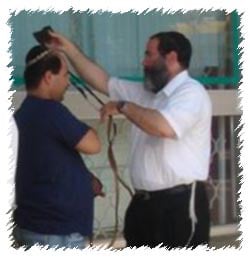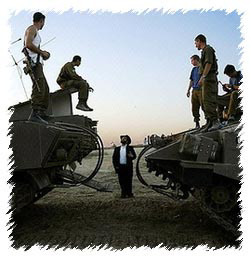July 16, 2006
Amid the attacks and tragedies that have engulfed northern Israel in the last few days, signs of strength, compassion, and courage have been present as well.
Throughout Israel, families have opened their homes to those who have chosen to head away from the war-torn north instead of remaining in bomb shelters.
The Chabad-Lubavitch communities in Kfar Chabad, Nachlat Har Chabad, Lod, Rechovot, Rishon L'tziyon – and many more – are hosting evacuees, of all walks of life, from the northern region. Kfar Chabad’s educational institutions were turned into makeshift hostels for citizens seeking refuge from the daily rocket barrages from Hizbullah terrorists in Lebanon. Among those who sought shelter were a group of campers from Vienna who found themselves stranded when their planned outing to the north was suddenly canceled due to the onslaught.
Families have opened their homes instead of leaving them to remain in bomb sheltersKfar Chabad council member Rabbi Shmuel Rivkin said families from Safed were on their way to seek shelter.
“We'll host as many as possible,” he said.
Before Shabbat – which came three days after Hizbullah ambushed an Israeli army patrol on Israel’s side of the border with Lebanon, capturing two soldiers and killing eight – Chabad Youth Organization personnel brought the traditional Shabbat foodstuffs of challahs and wine to victims holed up in bomb shelters. Chabad-Lubavitch counselors, including staff from the Chabad Terror Victims Project, have likewise been visiting bereaved and disrupted families since the close of Shabbat.
Women in Kfar Chabad, the Lubavitch village in the center of Israel, are volunteering to help with clothing, supplies, laundry, and other important daily routines for those displaced from their homes.
But the commitment of Lubavitch men and women to improving the spirits of Israelis has gone beyond the routine tasks of providing food and shelter.

Shlomo Mirov, an Israel Railways train driver and adherent of Lubavitch Chasidism, was just minutes away from pulling into the Haifa train station on Sunday when Katyusha rockets tore the depot apart, killing eight. He stopped the train following the explosions, which could be heard throughout the cabins, and in the midst of assisting the shaken passengers disembark, urged the men in his charge to put on tefillin.
(His effort echoed a plea made by the Lubavitcher Rebbe, Rabbi Menachem Mendel Schneerson, of righteous memory in the days before the 1967 Six Day War for Jewish men everywhere to don the Biblically-mandated prayer boxes in the assurance that G‑d would protect the Jewish people.)
"The children began crying, and panic began to prevail on the train,” Mirov told Chabad Online in Israel. “I got an immediate message to stop in Akko, and not to continue on my trip to Haifa, because of the suspicion there would be more attacks.
In Kfar Chabad women are volunteering to help with clothing, supplies and laundry"Despite the rush, people were willing to put on tefillin” to thank G‑d, he said.
Like Mirov, Chabad-Lubavitch emissaries visited shelters and other locales in Israel to encourage the performance of mitzvahs in general, and to help men put on tefillin in particular. In Akko, teams of shluchim gave out materials regarding the period of the three weeks leading up to Tisha B'Av, the commemoration of the destruction of the First and Second Temples, which falls on Aug. 3 this year. While observing the traditional signs of mourning mandated by Jewish law, Lubavitch emissaries try to focus people's attention also on the prayers and anticipation of the Third Temple, in particular by increasing in charity and in learning about the Third Temple.
And despite the constant threat of rocket attacks, Chabad emissaries in the north of Israel have been visiting local hospitals round the clock. The Chabad House in Tiberias, for instance, was nearly hit by a rocket on Shabbat during a festive gathering of Chasidim. That hasn’t stopped Rabbi Yosef Kramer, the Lubavitch emissary to the Galilee shore town, from checking in on patients and working to lift their spirits.
Other Chabad programs, though, have been forced by the security situation to make other arrangements. The day camp in Tiberias, which was scheduled to begin on Sunday with more than 200 children, has been postponed by Israeli authorities; Kramer said alternative activities are in the works. Similarly, the Chabad summer yeshiva program in Safed relocated last week to Kfar Sitrin.
Safed bore the brunt of the early attacks last week, and as with other northern towns, did not escape unscathed over the weekend. Miraculously, a Katyusha that hit the home of Erez and Ruthi Horowitz Shabbat afternoon merely became buried in the ground without exploding. Although the cellar, which had been prepared as a shelter for children to escape the threat of rockets, was badly damaged, no one was present when the missile struck. According to Ruthi Horowitz, the fact that the family woke up uncharacteristically late and attended the second minyan at their synagogue meant that they weren’t home when the rocket fell at 1:30 in the afternoon.
Chabad opened a storehouse with food, so that people who do not have food at home can come and get what they needIn Haifa, Israel’s third-largest city, Rabbi Chaim Shlomo Diskin – the Chabad representative of the suburban community of Kiryat Ata – said he is still getting his community organized. The sprawling port is still reeling from attacks many thought last week would never come. But the Katyusha bombardments represent the first time Hizbullah has struck so deep into Israel’s interior.
"On Friday we saw that all the stores were closed, and there were many elderly people and financially insecure families who were left with nothing,” he related. “So, today, we opened a storehouse with food, so that people who do not have food at home can come and get what they need.”
The rabbi admitted being more than a little frustrated at not being able to organize summertime activities for the community's children, but recognized it was for safety reasons. “We wanted to make a summer camp for the children, but the army forbade us from gathering large groups of children in the synagogue.”
Still, joyous events have continued in the face of danger.
In Nahariya, which had until last week escaped unscathed from the periodic flare-ups along the border some 10 kilometers to the north, 16 people braved the uncertainty of impending attacks to join Chabad Rabbi Yisroel Butman’s Shabbat prayers. But others joined the walk through the open streets to attend the brit of a fellow resident’s baby boy.
That afternoon, according to Butman, the windows in the coastal city reverberated from the constant pounding of rocket explosions. Yet again, he left the safety of shelter to provide encouragement to the municipality’s situation room.
Back in Haifa, Rabbi Diskin reported that a wedding was continuing as scheduled, if at a different location.
"There was a local family who had scheduled their wedding for tonight,” Diskin said on Sunday. “But the owners of the wedding hall refused to open for events now. I heard about this, and I called the family and said, 'Come to our synagogue and we'll have the wedding there.'
“Thank G‑d, we have a large facility with more than enough room.”







Join the Discussion